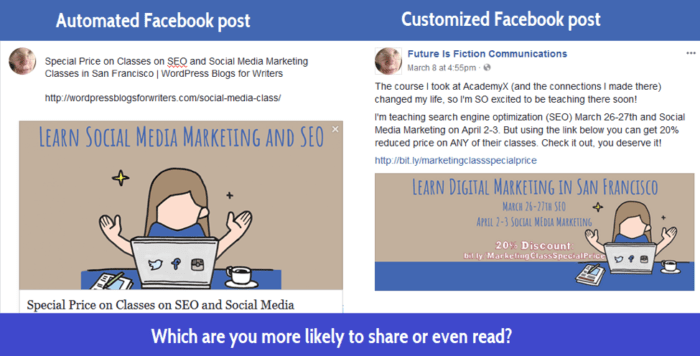12 Ways to Market Your Book (Despite the Facebook Apocalypse)
You may have noticed that your posts on Facebook aren’t getting as much traction as they used to—epecially the important posts promoting your book. Yikes. It’s what marketing pros are calling “Facebook apocalypse.” (Sound dramatic? Welcome to marketing!) A few weeks ago I explained why this is happening; this week, I explain what you can do about it.
The Three Most Important Words in Social Media: Engage, Engage, Engage
Before Facebook’s Russian troll problem, the company was already under criticism for promoting shallow content. A social network is supposed to be a place for friends to interact. So, when people complained they saw more posts from brands than from the people they know, Facebook took it seriously. Henceforth, comments are more important than likes or shares. In general, your posts are more likely to be seen if people are commenting on them. Facebook wants conversation, so generate that however you can.
Tag People on Your Posts
Facebook doesn’t show your post to all your friends. Instead, Facebook shows it to a small sample, and if those people like or comment, it will show your post to more people. But you don’t know which of your followers Facebook is going to show it to or if this post will be of interest to them. That is why whenever you have something important to share, you should tag people you think will find the topic engaging.
You can tag people on Facebook by typing the “@” symbol, followed by their name, and this should make their name appear in a drop-down list; then select the names you want to add. Do this at the end of the post so that the copy of the post is most likely to get read. Also, don’t be afraid to tag people in the comments if they are not in the conversation and should be.
I like to include a message explaining why I tagged them. For example, “I’m tagging @Howard Lovecraft and @Edgar Poe because I know you love a morbid conversation.”
Stop Relying on Autopost Tools
I understand how helpful it can be to have a plugin that autoposts your latest blog to Twitter and Facebook. But if even you never see your own post, you are breaking all three of the rules of social media. How can you expect people to engage with your post, if you yourself had no engagement with it?
The way Facebook works now, you get a preview of the title when you post a link. But, most of the time, a blog’s autopost uses the TITLE of the blog post as the content of the Facebook post. So, anyone can see that your contribution to the Facebook conversation was to simply copy the title that is already there, which might suggest this isn’t something especially important to you.
Additionally, the autopost won’t tag your friends, so you’re at the mercy of whomever Facebook randomly selects as to whether your post gets widely seen or not.
For example, which of the two posts below would you be more likely to comment on?

Even though the second example doesn’t ask a question, it is far more engaging and personal than the automated post.
Lean on Your Friends, But Don’t Ask for Likes
Mention people who will like your post, but don’t ask them to like or comment. Asking people for likes and comments does get more clicks, but it’s also an annoyance. So, Facebook now says they are going to bury posts that say things like “Please like and share.”
Use More Text-Only Posts on Facebook
The new Facebook algorithm values text-only posts more than posts to outbound links, like your latest blog. This is because, if you aren’t linking out, Facebook presumes that the text you’re posting is the content. This keeps the conversation on Facebook.
For example, instead of a promo to buy your latest giveaway, make your post a simple question: “Who would consider writing a review of my book in exchange for a free copy?” Get the conversation going, and link to the promo as appropriate in the comments.
Post More Video
I don’t mean a link to an external video site, like YouTube. Facebook wants you to post live video or upload home movies. These should be personal and immediate. Think of Facebook video as the same kind of post as the text-only post above, but instead of typing it out, you just start a virtual conversation with your audience with video.
For example, instead of posting a photo and quote from a presentation at the San Francisco Writers Conference, film a small segment of the presentation and ask your followers for feedback on it.
Post to a Related Group
Facebook wants engagement, and Groups are a way to bring people together around a common theme. Don’t just post your promo to the group, even if that’s what everyone else is doing. Start a conversation related to the topic of your book.
For example, in a Book Lovers group, instead of “Check out my latest cyberpunk” book, start a conversation about the best setting for a cyberpunk book. The people who join that conversation may be curious to learn about your new book.
Switch your Site to Using Facebook Comments
If your followers don’t tend to leave Facebook to comment on your blog, simply use Facebook for the comments on your website. Whenever someone posts a comment they’ll have the opportunity to share it as a post on Facebook too.
For example, on WordPress, I use the Super Socializer plugin to add Facebook comments.
Ask Your Friends & Fans Questions Related to What You’re Promoting
If you have a book signing or reading coming up, hopefully you have created a Facebook event. You don’t want to annoy people with constant reminders about the event, but you do want to keep it front of mind. So, include your audience in the planning of your event. This will increase engagement and make your events more likely to get seen.
For example, if you are planning a signing at a bookstore, you might ask on your event’s page if anyone would be willing to bring a bottle of wine.
Partner with Someone With a Bigger Audience
If your Facebook posts aren’t getting seen, think of who you know who might give your post a boost by sharing it with their larger audience. While tagging someone on a post is likely to get more people to see it, you can go even farther by posting on their wall. Only do this if the post is very relevant to that person and be sure that your post is customized to them specifically.
For example, if I’m doing a giveaway of a children’s book, I could post this on the wall of a friend who is a children’s librarian. “I was thinking you might know some parents who want to enter my contest.”
Buy Ads
I’ve already heard some communications pros tell me that they think Facebook is now going to be “pay to play.” At the end of the day, if you want your posts to get seen, that’s a problem that can be solved for a price. Just be sure to take the time to make your ads as targeted as possible. Not only for the niche that would be interested in your book, but also for the specifics of the ad you’re making.
Let this be a Reminder Why You Build Your Platform
You need your own site because what you post elsewhere, you don’t own. So many people use Facebook that it seems impossible to imagine what you post there is ever going away. But you can’t rely on someone else’s platform to promote your writing. There was a time when people thought AOL would be around forever.
Let this be a lesson though, that a website doesn’t have to disappear entirely to hurt your book marketing. Many people who previously relied on Facebook to promote their work are now seeing a loss of traffic and sales due to the changes in the Facebook algorithm. Ultimately, you want to build your own community—either on your own site or a site you share with a group of like-minded writers. Let Facebook be the beginning of the conversation, not the end of it.

